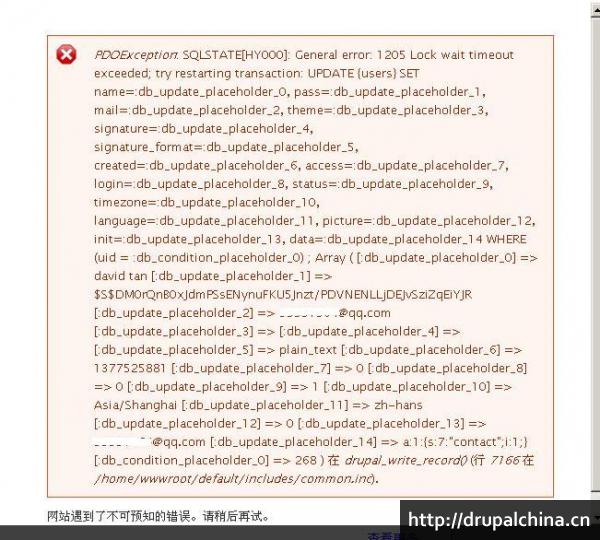大家好,我将一个虚拟主机的Drupal迁移到VPS(Debian 6系统,LNMP.ORG安装包,启用MySQL InnoDB)后,我测试注册用户时出现了错误。
- 昵称 ****** 已被占用。
- 电子邮件地址 ***** 已经注册过了。忘记密码了吗?
但是实际是没有占用、注册的。另外,这个注册花费了很长的时间,甚至有时候出现502错误。而如果是昵称确实被占用,但是邮件地址未注册时,很快就会提示昵称被占用的结果页面。
此外,在管理用户的后台页面,马上又能看到刚刚注册的用户,而且是已经激活的了(本来是要管理员的账户操作激活的)。
另外,还有一个错误是在后头,禁用或激活一个账户时,也经常提示错误。但是如果是取消某个账户,很快就好了。
PDOException: SQLSTATE[HY000]: General error: 1205 Lock wait timeout exceeded; try restarting transaction: UPDATE {users} SET name=:db_update_placeholder_0, pass=:db_update_placeholder_1, mail=:db_update_placeholder_2, theme=:db_update_placeholder_3, signature=:db_update_placeholder_4, signature_format=:db_update_placeholder_5, created=:db_update_placeholder_6, access=:db_update_placeholder_7, login=:db_update_placeholder_8, status=:db_update_placeholder_9, timezone=:db_update_placeholder_10, language=:db_update_placeholder_11, picture=:db_update_placeholder_12, init=:db_update_placeholder_13, data=:db_update_placeholder_14 WHERE (uid = :db_condition_placeholder_0) ; Array ( [:db_update_placeholder_0] => david tan [:db_update_placeholder_1] => $S$DM0rQnB0xJdmPSsENynuFKU5Jnzt/PDVNENLLjDEJvSziZqEiYJR [:db_update_placeholder_2] => ********@qq.com [:db_update_placeholder_3] => [:db_update_placeholder_4] => [:db_update_placeholder_5] => plain_text [:db_update_placeholder_6] => 1377525881 [:db_update_placeholder_7] => 0 [:db_update_placeholder_8] => 0 [:db_update_placeholder_9] => 1 [:db_update_placeholder_10] => Asia/Shanghai [:db_update_placeholder_11] => zh-hans [:db_update_placeholder_12] => 0 [:db_update_placeholder_13] => ********@qq.com [:db_update_placeholder_14] => a:1:{s:7:"contact";i:1;} [:db_condition_placeholder_0] => 268 ) 在 drupal_write_record() (行 7166 在 /home/wwwroot/default/includes/common.inc).
网站遇到了不可预知的错误。请稍后再试。

大家帮忙看看,有没有好的解决办法。谢谢。
将Debian 6更新到Debian 7系统后,还是出现类似错误
PDOException: SQLSTATE[HY000]: General error: 1205 Lock wait timeout exceeded; try restarting transaction: UPDATE {users} SET name=:db_update_placeholder_0, pass=:db_update_placeholder_1, mail=:db_update_placeholder_2, theme=:db_update_placeholder_3, signature=:db_update_placeholder_4, signature_format=:db_update_placeholder_5, created=:db_update_placeholder_6, access=:db_update_placeholder_7, login=:db_update_placeholder_8, status=:db_update_placeholder_9, timezone=:db_update_placeholder_10, language=:db_update_placeholder_11, picture=:db_update_placeholder_12, init=:db_update_placeholder_13, data=:db_update_placeholder_14 WHERE (uid = :db_condition_placeholder_0) ; Array ( [:db_update_placeholder_0] => ******** [:db_update_placeholder_1] => $S$DlDXPsrqObOOhlM5/5ebqVFrB2lkZAhynB/OMiA51QvptQ7nDBso [:db_update_placeholder_2] => ********@gmail.com [:db_update_placeholder_3] => [:db_update_placeholder_4] => [:db_update_placeholder_5] => plain_text [:db_update_placeholder_6] => 1375341927 [:db_update_placeholder_7] => 0 [:db_update_placeholder_8] => 0 [:db_update_placeholder_9] => 0 [:db_update_placeholder_10] => Asia/Shanghai [:db_update_placeholder_11] => en [:db_update_placeholder_12] => 0 [:db_update_placeholder_13] => ********@gmail.com [:db_update_placeholder_14] => a:1:{s:7:"contact";i:1;} [:db_condition_placeholder_0] => 244 ) 在 drupal_write_record() (行 7166 在 /home/wwwroot/default/includes/common.inc).
网站遇到了不可预知的错误。请稍后再试。
max_allowed_packet = 64M 更改后还是不行。
# # The MySQL database server configuration file. # # You can copy this to one of: # - "/etc/mysql/my.cnf" to set global options, # - "~/.my.cnf" to set user-specific options. # # One can use all long options that the program supports. # Run program with --help to get a list of available options and with # --print-defaults to see which it would actually understand and use. # # For explanations see # http://dev.mysql.com/doc/mysql/en/server-system-variables.html # This will be passed to all mysql clients # It has been reported that passwords should be enclosed with ticks/quotes # escpecially if they contain "#" chars... # Remember to edit /etc/mysql/debian.cnf when changing the socket location. [client] port = 3306 socket = /var/run/mysqld/mysqld.sock # Here is entries for some specific programs # The following values assume you have at least 32M ram # This was formally known as [safe_mysqld]. Both versions are currently parsed. [mysqld_safe] socket = /var/run/mysqld/mysqld.sock nice = 0 [mysqld] # # * Basic Settings # user = mysql pid-file = /var/run/mysqld/mysqld.pid socket = /var/run/mysqld/mysqld.sock port = 3306 basedir = /usr datadir = /var/lib/mysql tmpdir = /tmp lc-messages-dir = /usr/share/mysql skip-external-locking # # Instead of skip-networking the default is now to listen only on # localhost which is more compatible and is not less secure. bind-address = 127.0.0.1 # # * Fine Tuning # key_buffer = 128M max_allowed_packet = 64M thread_stack = 192K thread_cache_size = 8 # This replaces the startup script and checks MyISAM tables if needed # the first time they are touched myisam-recover = BACKUP #max_connections = 100 #table_cache = 64 #thread_concurrency = 10 # # * Query Cache Configuration # query_cache_limit = 1M query_cache_size = 128M # # * Logging and Replication # # Both location gets rotated by the cronjob. # Be aware that this log type is a performance killer. # As of 5.1 you can enable the log at runtime! #general_log_file = /var/log/mysql/mysql.log #general_log = 1 # # Error log - should be very few entries. # log_error = /var/log/mysql/error.log # # Here you can see queries with especially long duration #log_slow_queries = /var/log/mysql/mysql-slow.log #long_query_time = 2 #log-queries-not-using-indexes # # The following can be used as easy to replay backup logs or for replication. # note: if you are setting up a replication slave, see README.Debian about # other settings you may need to change. #server-id = 1 #log_bin = /var/log/mysql/mysql-bin.log expire_logs_days = 10 max_binlog_size = 100M #binlog_do_db = include_database_name #binlog_ignore_db = include_database_name # # * InnoDB # # InnoDB is enabled by default with a 10MB datafile in /var/lib/mysql/. # Read the manual for more InnoDB related options. There are many! # # * Security Features # # Read the manual, too, if you want chroot! # chroot = /var/lib/mysql/ # # For generating SSL certificates I recommend the OpenSSL GUI "tinyca". # # ssl-ca=/etc/mysql/cacert.pem # ssl-cert=/etc/mysql/server-cert.pem # ssl-key=/etc/mysql/server-key.pem [mysqldump] quick quote-names max_allowed_packet = 64M [mysql] #no-auto-rehash # faster start of mysql but no tab completition [isamchk] key_buffer = 128M # # * IMPORTANT: Additional settings that can override those from this file! # The files must end with '.cnf', otherwise they'll be ignored. # !includedir /etc/mysql/conf.d/
更新了几个数据,但是还是不行,上面的东西还有其他要更改吗?
更新了几个数据,但是还是不行,上面的东西还有其他要更改吗?

修改一下max_allowed_packet试试